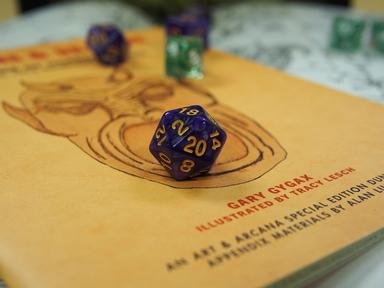Quiz Answer Key and Fun Facts
1. One of the most important changes from 2nd edition Advanced D & D rules was the removal of the Thac0 system. Which of the following replaces this?
2. One of the important concepts in 3rd edition D & D is the concept of 'Skill' points. The amount of skill points you get depends on one of your abilities. Which one?
3. I am a 15th level ranger with 22 Strength, 20 Dexterity, 20 Constitution, 15 Intelligence, 9 Wisdom and 17 Charisma. Up to which level of ranger spells will I be able to cast?
4. In 3rd edition D & D rules, there are three types of saving throws. Which of the following is NOT one of them?
5. The lower your AC (Armour Class), the better chance you have of defending an attack.
6. What is the Experience point penalty if you multi-class into a non-favoured class?
7. Another important concept is 'Feats'. Which of the following is NOT a feat offered by 3rd edition D & D?
8. Your Armour Class (AC) is determined by different things. Which of the following does NOT affect your AC?
9. Which of these classes get the feats 'Two weapon fighting' and 'Ambidexterity' free when they are wearing light or no armour?
10. Another new addition is the introduction of new sub-races to choose from. Which of the following is NOT one of these sub- races? (Kindly note that Neverwinter Nights doesn't offer many of these new races).
Source: Author
ace_sodium
This quiz was reviewed by FunTrivia editor
silverginger before going online.
Any errors found in FunTrivia content are routinely corrected through our feedback system.
